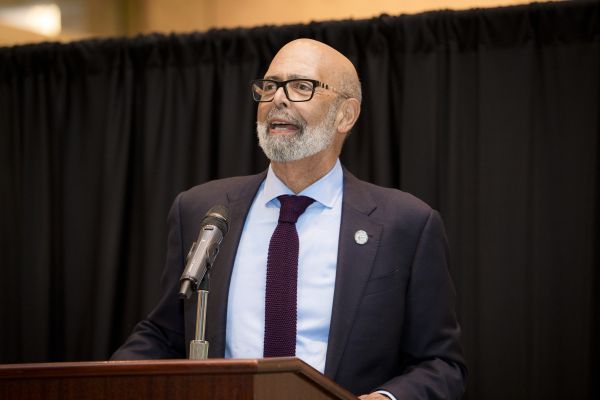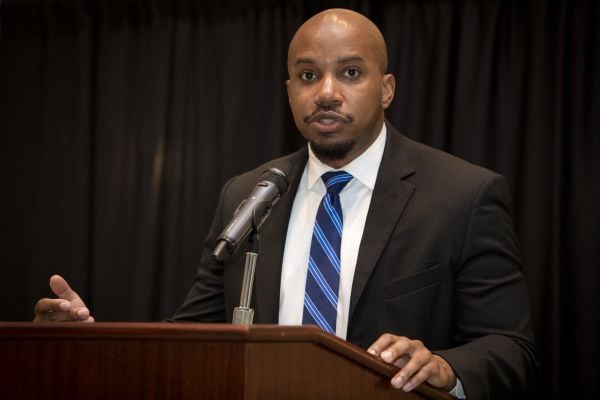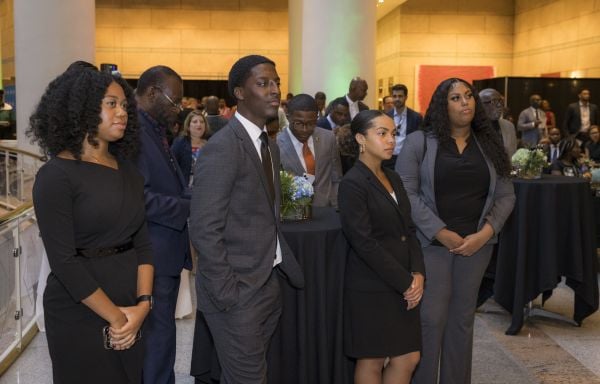In This Newsletter
The HBCU Strategic Initiative and Fellows Program
ICAP in Action
ICAP News and Trends
The HBCU Strategic Initiative and Fellows Program
The Inaugural Cohort Wraps a Groundbreaking Launch Year for the Fellows Program
In September, the Inclusive Capitalism (ICAP) team hosted a graduation reception alongside the Congressional Black Caucus (CBC) Annual Legislative Conference. The Milken Institute network and supporters celebrated the inaugural cohort's successful completion of the HBCU Fellows Program. Throughout the program, fellows were exposed to the foundations of the financial industry while putting their knowledge into practice by attending conferences and participating in summer internships at JPMorgan Chase & Co., TradeWeb, UBS, AllianceBernstein, and other top financial firms. President of the United Negro College Fund, Michael Lomax, PhD, and deputy director of the White House Initiative on HBCUs, Naeem Jenkins-Dixon, celebrated the fellows and provided remarks during the reception.

Michael Lomax, PhD, President of the United Negro College Fund

Naeem Jenkins-Dixon, Deputy Director of the White House Initiative on HBCUs

HBCU fellows and reception attendees

Troy Duffie, associate director, Nicole Valentine, director, and Melanie Schwartz, senior associate of MI Finance
Applications Open for Cohort Two
The ICAP program officially launched applications for the HBCU Fellows Program second cohort, with applications open until October 29. Students from any HBCU are encouraged to apply. Learn more.
If you are interested in partnering with the Milken Institute HBCU Strategic Initiative and Fellows Program, please reach out to Troy Duffie.
ICAP in Action
Policies That Progress Diversity, Equity, and Inclusion
During the CBC Annual Legislative Conference, the Milken Institute Diversity, Equity, and Inclusion (DEI) in Asset Management Executive Council hosted a private policy dialogue with Milken Institute senior leadership, members of Congress, and members from the Biden administration on policy solutions to expand access to diverse managers, opportunities to expand access to diverse talent at established firms, and the latest data on the performance of diverse teams. The insights shared during the discussion will inform our program work.
The DEI in Asset Management Executive Council Meets in Washington, DC
In September, the DEI in Asset Management Executive Council met in Washington, DC, to discuss navigating DEI-centered conversations in their respective firms and institutions. A panel featuring US Chamber of Commerce Senior Vice President Rick Wade, Cooley Partner Joseph Drayton, and National Association of Corporate Directors (NACD) Chief People Officer Tracy Gee highlighted legal frameworks in place that still allow for DEI to continue being prioritized in the financial services industry. At the meeting, Gee presented the NACD Diversity Discussion Guide for Directors, a tool to help boards in the earliest stages of conversation about board diversity and boards looking to refocus their conversation in light of new trends regarding DEI.
ICAP News and Trends
CBC Week Focuses on Black Economic Mobility
This year, many of the highlights from the CBC Annual Legislative Conference centered around economic issues within the Black community, most notably a call to break down racial barriers in the private sector. The CBC called for a defense of corporations with strong DEI policies in training, hiring, and promotion. In a panel discussion reported in The Messenger, Representative and CBC Chairman Steven Horsford stated, "This is a clarion call to hold the line on DEI in the private sector, in schools, and government—and to expand the vision for creating true Black wealth." In the wake of the Supreme Court's affirmative action ruling, federal support for DEI practices and policies will be critical for institutions to continue creating a more equitable and inclusive landscape necessary for a more efficient workforce and robust economy.
Governors Called to Fund Land-Grant HBCUs Equitably
Last Month, US Secretary of Education Miguel Cardona and US Secretary of Agriculture Thomas Vilsack sent letters to 16 governors highlighting the over $12 billion disparity in funding between land-grant Historically Black Colleges and Universities (HBCUs) and their non-HBCU land-grant peers in their states. Under the Second Morrill Act of 1890, states choosing to open a second land-grant university to serve Black students were required to provide an equitable distribution of state funds between their 1862 and 1890 land-grant institutions. Each letter outlined the amount each state’s 1890 HBCU has been underfunded per student in state-appropriated funds between 1987 and 2020 and suggests possible remedies. “I am continually inspired by all that HBCUs have achieved despite having to punch above their weight. Our HBCUs graduate a huge share of our nation’s Black educators, doctors, engineers, judges, and lawyers. These institutions and the talented, diverse students they serve must have equitable funding in order to reach their full potential and continue driving innovation," said Secretary Cardona about the letters sent to the governors. Equity must begin at the educational level to ensure Black and other young generations of color have equitable opportunities in the workforce.
Spelman College Launches FinTech Literacy Program
In August, Stackwell, a digital investment platform designed to eliminate the racial wealth gap, and Fintech in Action, a social impact initiative that accelerates progress, innovation, and opportunity for Black talent in finance and FinTech, launched a new financial wellness program supporting HBCU students, as reported in Essence. For their pilot program, the two organizations partnered with Spelman College. A cohort of 16 students will receive $250 in seed money and will participate in Stackwell workshops that focus on finance and investing fundamentals to help them begin building wealth while in college. Progress will be tracked over three years to assess how the cohort builds wealth over time. The program aims to provide access to the financial markets, kickstart a foundational investment education, and provide ongoing resources to enable and empower the students to grow their investments over time. Students will graduate with all the funds they have amassed, providing a solid financial foundation as they begin their professional careers.
